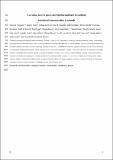Exorcising Grice's ghost : an empirical approach to studying intentional communication in animals
Abstract
Language's intentional nature has been highlighted as a crucial feature distinguishing it from other communication systems. Specifically, language is often thought to depend on highly structured intentional action and mutual mindreading by a communicator and recipient. Whilst similar abilities in animals can shed light on the evolution of intentionality, they remain challenging to detect unambiguously. We revisit animal intentional communication and suggest that progress in identifying analogous capacities has been complicated by (i) the assumption that intentional (that is, voluntary) production of communicative acts requires mental-state attribution, and (ii) variation in approaches investigating communication across sensory modalities. To move forward, we argue that a framework fusing research across modalities and species is required. We structure intentional communication into a series of requirements, each of which can be operationalised, investigated empirically, and must be met for purposive, intentionally communicative acts to be demonstrated. Our unified approach helps elucidate the distribution of animal intentional communication and subsequently serves to clarify what is meant by attributions of intentional communication in animals and humans.
Citation
Townsend , S W , Koski , S E , Byrne , R W , Slocombe , K E , Bickel , B , Boeckle , M , Braga Goncalves , I , Burkart , J M , Flower , T , Gaunet , F , Glock , H J , Gruber , T , Jansen , D A W A M , Liebal , K , Linke , A , Miklósi , Á , Moore , R , van Schaik , C P , Stoll , S , Vail , A , Waller , B M , Wild , M , Zuberbühler , K & Manser , M B 2017 , ' Exorcising Grice's ghost : an empirical approach to studying intentional communication in animals ' , Biological Reviews of the Cambridge Philosophical Society , vol. 92 , no. 3 , pp. 1427-1433 . https://doi.org/10.1111/brv.12289
Publication
Biological Reviews of the Cambridge Philosophical Society
Status
Peer reviewed
ISSN
1469-185XType
Journal article
Description
S. W. T., S. E. K., and I. B. G. thank the University of Zurich's Graduate Campus Grant for funding the workshop.Collections
Items in the St Andrews Research Repository are protected by copyright, with all rights reserved, unless otherwise indicated.

